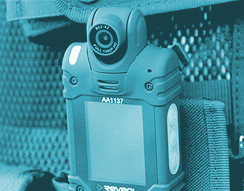Discretion kept for NSW cops
 NSW Police will continue to choose when they want to record footage from body-worn video (BWV) cameras.
NSW Police will continue to choose when they want to record footage from body-worn video (BWV) cameras.
A statutory review of the camera technology has been released by the Department of Communities and Justice (available here in PDF form), which calls for no changes to the underpinning legislation.
This was after a number of stakeholders raised concerns about the high level of discretion police are afforded for the use of the cameras under the Surveillance Devices Amendment (Police BWV) Act.
The Law Society, Legal Aid, the Aboriginal Legal Service (ALS) and Redfern Legal Centre (RLC) all put forth the view that “police should be required (by legislation or public available guidelines) to activate BWV in certain situations”, such as when making an arrest.
The ALS and RLC went further, saying “police should be required to continuously record when in a public place, or at least during all interactions with members of the public”.
Advocates believe that giving officers less choice over when they can record will increase the value of the cameras, by holding officers more accountable for their actions.
It is seen as a win-win, in that officers would either record more evidence that they would not have gathered if they had not turned the camera on, or they will have to explain why they thought a given interaction should not be documented.
However, NSW Police has been less than forthcoming with information about how it sees the use of the cameras.
It took two years after the initial rollout of the cameras for the force to release the standard operating procedures (SOPs) for BWV.
Although the SOPs include “factors a police officer should take into account when deciding whether to activate the BWV camera, including community expectations, officer safety and protection and the need to capture evidence”.
The recent review stated “removing police officer discretion to record by mandating continuous recording … is not a practical solution”, due to the privacy implications.
“The review considers that it would be unnecessary to enshrine in legislation the specific circumstances in which police must use body-worn video,” the review states.
“The review considers that the SOPs provide a significant amount of detail guiding both police and the public on how the discretion should be exercised.
“Police officers encounter varied and dynamic situations on a daily basis and it is often necessary for police to use their judgment and experience when deciding when it is appropriate to use BWV.”
The review included findings from a Charles Sturt University evaluation of NSW Police’s use of BWV, which was based on input from 1,629 members of the public, 811 police officers and 77 members of the legal profession.
Overall, it found “police BWV is meeting its intended purposes as an investigative and evidentiary tool”, creating a number of positive impacts on the judicial process and reducing complaints and violence against officers.
Almost 90 per cent of the members of the public surveyed said they support the use of BWV, believing it increases accountability for police and the community. However, there was significant concern that footage could be “manipulated by police due to the officer discretion”.
Around half of the officers interviewed said body cameras cause delays due to the additional time to transcribe the footage, and other factors.
NSW Police will trial the use of automated transcription technology later this year.







 Print
Print